News
Stay updated with the latest from Volunteering New Zealand

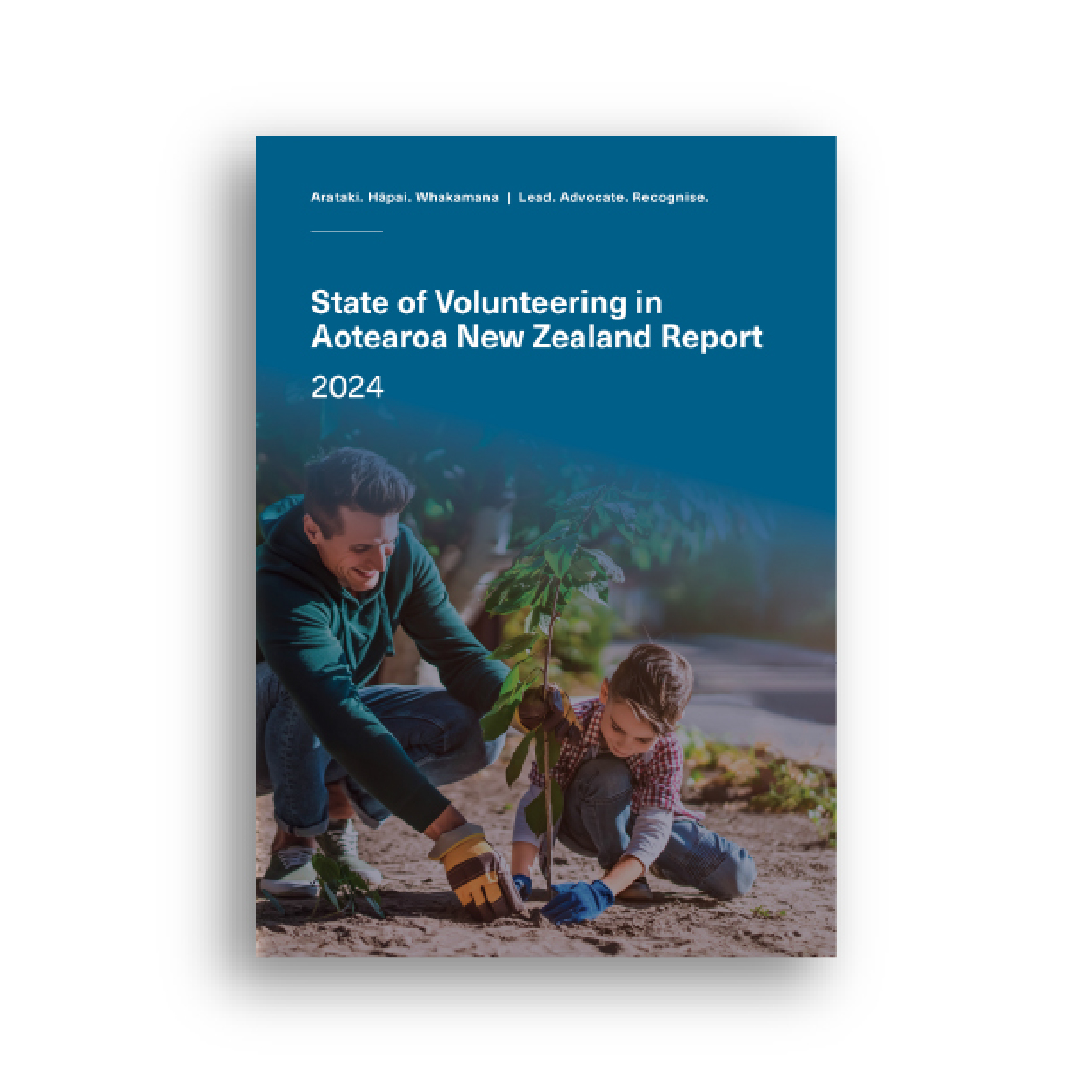
Latest News
Research
Volunteering becoming more casual: State of Volunteering report 2024
Media release: 24 September 2024More volunteers are casual, giving a few hours a month to their chosen charity, a new State of Volunteering report has found.“This new trend overturns the idea of the ‘civic core’ of a few people doing the most voluntary work.
We’re now hearing that a quarter of volunteers in organisations perform up to five hours of volunteer work a month, while only 7% do 20 hours or more,” says Michelle Kitney, Chief Executive of Volunteering New Zealand.The research, The State of Volunteering in Aotearoa New Zealand 2024, highlights changes and challenges for community organisations who involve volunteers.The recent Covid-19 pandemic, and the cost-of-living situation have affected volunteering.
Many organisations have struggled to recruit new volunteers, while there has also been an increase in online-only organisations.Organisations say their biggest challenges are not enough volunteers, and not enough time or resources to support their volunteers.
There are also important regional differences, for example, smaller rural areas (such as Gisborne-Tairawhiti and Southland) had fewer volunteers who had been volunteering for less than a year; while Northland, Southland, Waikato, Bay of Plenty and Taranaki, had many more volunteers of over 15 years’ duration.“Organisations are adapting to the changing landscape of volunteering.
They need to be prepared to change their practices to enable volunteer participation in the face of ongoing challenges, Michelle says.“All volunteer-involving organisations should value volunteers.
We encourage them to tap into resources, such as our Best Practice Guidelines, to ensure volunteers have a great experience.”The State of Volunteering 2024 report is published on the Volunteering New Zealand website.

Here is the updated Constitution of Volunteering New Zealand for your review and consultation.
In collaboration with Parry Field Lawyers, our Board has carefully revised the current Constitution to align with the rules and regulations of the new Incorporated Societies Act 2022.The primary changes reflect the modernisation of the old 1908 Act, particularly in areas such as dispute resolutions and financial reporting requirements.
Additionally, the new Act mandates that all Societies must have a governing body and an official constitution.Key changes in Volunteering New Zealand’s updated Constitution include:
- Incorporation of our Name and Values: The name "Tūao Aotearoa/Volunteering New Zealand" has been officially incorporated, and our values are now expressed through a te ao Māori lens.
- Policy Adjustments: The Conflict of Interest and Dispute Resolution sections have been moved out of the Constitution and into separate Policy documents.
- The new Constitution includes references to the Act, which adequately covers both matters.
- Board Composition: The structure of the Board has been updated.
- It now includes the option of having two Co-Chairs instead of a single Chair, along with a Treasurer and members.
- This change also includes a revised division of powers.
- Includes definition of a 'Volunteer Centre': means a regional community organisation, trust or incorporated society providing volunteer recruitment services, and capacity building support for volunteer involving orgnisations in their community.
Please read through the Constitution to understand any potential impacts the new Act may have on your organisation.
Send your comments or queries to the Board via office@volunteeringnz.org.nz by 30 August.
A member of the Board’s Constitution Workgroup will respond to your queries.We intend to approve the new Constitution at the Volunteering New Zealand AGM on 11 November.We appreciate your time and consideration and look forward to your participation in the AGM.

Leadership
Volunteers
Youth
Providing a voice for volunteers at Hato Hone St John
[caption id="attachment_61300" align="alignleft" width="150"]

Nate Whitfield[/caption]A volunteer viewpoint is very useful for paid staff, says Nate Whitfield of his experiences with Hato Hone St John.Nate has been involved with Hato Hone St John since the age of 12 when he aspired to be a paramedic, and now has three volunteer roles as well as a part-time job (20 hrs p/w) with the fundraising team.“We are enabled by volunteers, so being a volunteer helps me understand and relate to volunteers.”Last year Nate was the Hato Hone St John National Cadet of the Year, and says support for young people comes from the top – the organisation’s Chancellor is an advocate for youth.“[Hato Hone St John] youth programmes can be a pipeline into governance roles.
Even when you are the only young person in a room, there are advocates all around.”Nate is on the Volunteer Support Group – a governance committee formed to whakamana (give effect to) the voice of St John’s 9,000 volunteers.
His experience of how policies and systems affect volunteers is very relevant.Challenges facing volunteer management include working towards digital equity of access and broader representation in leadership.He is also on the St John International Youth Advisory network, one of two people representing New Zealand.It’s a wonder Nate has time for his University studies – completing a BA in Māori Studies and English, and planning to go on to a Master’s degree in Communications.
But you get the feeling his volunteering experiences will take him far.Find out more about volunteering with Hato Hone St John.

When it comes to doing better by student volunteers and getting students involved in your volunteering programme is to listen directly to the views of students. What do we know from working with student and younger volunteers?
- Students want to see the difference they’ve made
"I love how the time I’ve put aside to work with young people has made a tangible difference in their lives and I’ve been able to see them grow", says student Lara, who has volunteered with Brownies for several years.
When volunteering, students want to be able to visualise how their time and effort has resulted in a positive change in the long term.
So, it’s a good idea to have students working on a project where they are making a tangible difference and can see the change they are making.
- Show students what they can gain
"Through volunteering I’ve learnt how to help people out – I’ve never really helped before", says student Ryan, who helps disabled children in his community.
Talk to any student and they’ll tell you how busy they are with university, work and a social life.
So, it’s useful to show students what they can gain through volunteering.
This can be through showing them the new skills that can be gained, or through recognition, for example on university transcripts or during award ceremonies.
- Students love that volunteering can enhance employment opportunities
For many students, the future is a mystery – who knows whether the job they end up in will be linked to their university studies?
According to Jane Fletcher, the Assistant Manager of Careers and Employment at Victoria University of Wellington, volunteering helps students to "connect the dots between their experiences and their employability skills".
So, when attracting volunteer recruits, demonstrate to students how they can enhance their employment opportunities by linking volunteering activities to the knowledge or skills required in the workplace.
- Make it easy for students to love volunteering by engaging in best practice
To ensure that students enjoy volunteering, make the experience as straightforward as possible.
Particularly for those volunteers that are highly motivated and interested in the culture of the organisation, make sure that you:
- suggest new ways your organisation can acknowledge the contribution of younger volunteers.
- be prepared to train the volunteer when aspects of the role are new.
- No one wants to be in a position where they are setup to fail.
- make it easy for people to volunteer by being creative and flexible when designing volunteering opportunities.
- Communicate, communicate, communicate
Make sure that you communicate regularly with volunteers so they stay in touch and engaged with your organisation and the work that you do.
Consider using a range of communication mediums, particularly those that students actively use, such as text message, Skype or social media.
Designate a person within your organisation who is responsible for engaging with volunteers and ensure they are frequently releasing fresh information.
Finally, encourage feedback from previous volunteers and consider how this can be used to improve current practices.

Diversity
Leadership
VNZ Events
Volunteers
Wellbeing
Top Tips for Engaging with Youth

By Alice ManderYoung volunteers can bring a lot to an organisation, but we know that some organisations aren’t sure how to engage with youth.
After speaking with four awesome youth volunteers, I’ve used their experiences to create some top tips for working with young people in volunteering organisations.
Authenticity
Young New Zealanders are skilled, passionate, and insightful.
We have a lot to bring to the table, beyond just being a youth voice.
We don’t want to feel like we’re valued just for our age but, rather, as a whole person.
If possible, having young people as staff or on your boards is one way to show that you are serious about youth engagement.
It also has a trickle down effect - if we can see ourselves in your organisation, we are more likely to want to join in.
“There’s so many things that young people can give, and it’s not just because they are a number, or you need us to be the ‘youth voice’.
There’s so many skills that we have, apart from our age.” - Mardiya Abdulaziz
“ More young people, or a balance of young people, is a good way to start. Like attracts like.”- Neo Kenny.
Diversity
Recognising and respecting the diversity of young people is critical, we are not a monolith.
Be welcoming to all young people, regardless of their background, or your assumptions about their abilities.
Young people will feel more comfortable in your organisation if we know that we can show up as our full selves.
The beneficiaries of your organisation’s work will also benefit from the diversity of your volunteers. “I think it’s just simple things - not asking for people’s legal names unless you have to, having space for preferred names, having space for pronouns but not making it mandatory, giving space to share pronouns if you’re meeting new people.
It’s not hard to make things rainbow friendly!
Be open, take a couple extra steps.” - Neo Kenny, InsideOUT Kōaro.
“I definitely have had to be careful what roles I put myself into because attitudes of some people can be hurtful, and it can be challenging if someone brings their own experiences or beliefs in but it’s misinformed, or they haven’t spoken to me.” - Lauren Dewhirst, disabled volunteer.
Flexibility
Most young people have multiple obligations, on top of volunteering.
Being pulled in too many directions can lead to burnout.
We are more likely to join organisations which allow flexibility and recognise competing interests.
Meet youth where we are - avoid minimum hour expectations, allow us to volunteer in ways which align with our skills and passions, and encourage your volunteers to prioritise their own wellbeing.
Appreciation
Young people, like all people, want to feel appreciated.
Many are also embarking on new careers, or trying to find paid employment.
Appreciating and valuing their volunteering is one way you can give back to them.
This may look like offering to be a referee for job applications, giving koha after milestones, or celebrating them on social media.
All of this contributes to young people’s growth and development.
“For me, with Youthline, I am learning quite valuable life skills. The way I sold it is that it is a benefit to not only the people I talk to on the Helpline but it is also sharpening my tools and skill sets which will only benefit my employer,” - Ethan Tauevihi-Kahika on how he balances employment and volunteering
Read the stories of these youth volunteers

Leadership
News
Youth
Youth participation at board level
Developing a youth board member role
This blog considers why Volunteering New Zealand sought youth participation on its Board and how it has evolved its youth board member role.Targeted engagement of young people into board roles has been growing over the last decade.
Volunteering Marlborough delivered a youth on boards programme in 2018."One simple trick to achieve the ‘youth engagement’ so many organisations strive for?
Actually offering young people a seat at the table."Examining the Youth Ladder of participation is a great task for organisations to assess where they are at in terms of their youth engagement.
The ideal is for young people to be participating at the decision making table.

This is an aspiration that Volunteering New Zealand has worked on over the last few years.
Volunteering New Zealand appointed its first elected Youth Board member in 2022.
In the lead up to launching this role, Volunteering New Zealand's board did a lot of work to introduce and implement a role that greater enabled a youth voice at board level.
In 2020, Volunteering New Zealand specifically co-opted its first youth board member Ryan Hooper Smith.
Ryan, the wider board and a Youth Working Group collectively worked to deliver and design a targeted Youth Board Member role for Volunteering New Zealand.At our 2021 Annual General Meeting, Volunteering New Zealand board proposed a change to our constitution to include a mandated Youth Board Member role.
This was affective from our 2022 AGM.
In the interim, Volunteering New Zealand then co-opted an additional youth member, Matthew Goldsworthy until our first formally elected youth member was elected."If you’re a leader, an executive, a board member – anyone who has any form of responsibility – I encourage you to invite young people into your conversations.
Whether it’s in governance or in operations, ask their opinions and listen with an open mind.
Embrace the curiosity and creativity that comes from working with youth." Goldsworthy.In 2022, we had our first Youth Board Member formally nominated onto our board. Donald McIntosh.
Donald is a strong proponent for having more young people in the board room."It’s generally accepted that a diverse board, bringing together a range background and skills, does better governance.
However, so far at least, young people have been largely left out of the picture." McIntosh
How does our Youth Board Member role actually work?
Currently, our Youth Board Member is elected for a two-year term, with the ability to be re-elected for another two-year term.
There is no minimum or maximum age for this position, however there is the expectation that this person is young and has experience as a young volunteer.
Experience working on a board or in governance is not necessary - we care more about your willingness to learn about governance.
And the role of the Youth Board Member has identical voting rights and responsibilities as other Board Members at Volunteering New Zealand.Our board members can expect to give approximately 10-20 hours per month of volunteer time, but this can vary depending on workload.Our quarterly board meetings are usually face-to-face, so some travel is required.
Although this is a voluntary position, your travel expenses will be covered by Volunteering New Zealand.An election process in accordance with our constitution will be conducted before our AGM in November.
Our new youth board member role is for up to two two-year terms.

Latest News
Recognition
How to get involved in The Big Shout-out 2024

This June we are wanting to give a #BigShoutOut to the volunteers in our community!
They are our companions, firefighters, sports team coaches, fierce advocates, environmental stewards, and so much more.
It is their time to shine, and we need your help to say thank you!
Get all campaign resources for the Big Shout Out.
Create a video to share

Share your thanks to the volunteers who have contributed to your organisation or community.
Create a short video saying “Thank you” to a volunteer, or a group of volunteers who have made a difference in your life or the lives of others in your community. Ask a volunteer to say why they love volunteering!
Here are some prompts/ questions to answer in your video.
How to film the video
- Use an I-Phone or other device with a high quality camera to film your video.
- Try to film in a space where there is minimal background noise (indoors is best, and avoid busy areas).
- If possible, film your video against a clear and uncluttered background.
- IMPORTANT: Please record your video in the right format.
- Portrait works best for Instagram, Landscape may work best for Facebook.
- In your video, please say your name and what organisation you are from or represent (if applicable).
Share your video on your socials and tag #thebigshoutout
We would love to share them too! Email: margaret@volunteeringnz.org.nz

Volunteering New Zealand is running a mentoring programme for volunteer co-ordinators/ leaders.
The next programme runs from May to November 2024.
We've already had applications from wonderfully deserving mentees - could you be a mentor to one of them?For a small amount of time (an hour a month) you could make an incredible difference.
The volunteer co-ordinators we've spoken to for the programme get no paid training for their roles, yet they are responsible for many volunteers and significant work.We're running a proven mentoring programme, with support from the Mentoring Foundation.
As a mentor, you will find you get as much from the programme as the mentee!Here are some comments from participants in our previous programme:
“I am so enjoying this and as I know I am getting as much from it as I hope the mentee is, it has led me to think of maybe looking to do it more in future.
It’s a fantastic initiative and so well organised.
THANKYOU!” (mentor)"“I’m really enjoying my mentor.
She has been very helpful for me in regard to 'what next' for my volunteer project and beyond.
A big thanks to VNZ for that programme, it is very valuable particularly as I have limited support in my current role.” (mentee)
If you are an experienced volunteer manager and would like to help others in their leadership development, we would love to hear from you. Find out more and apply.
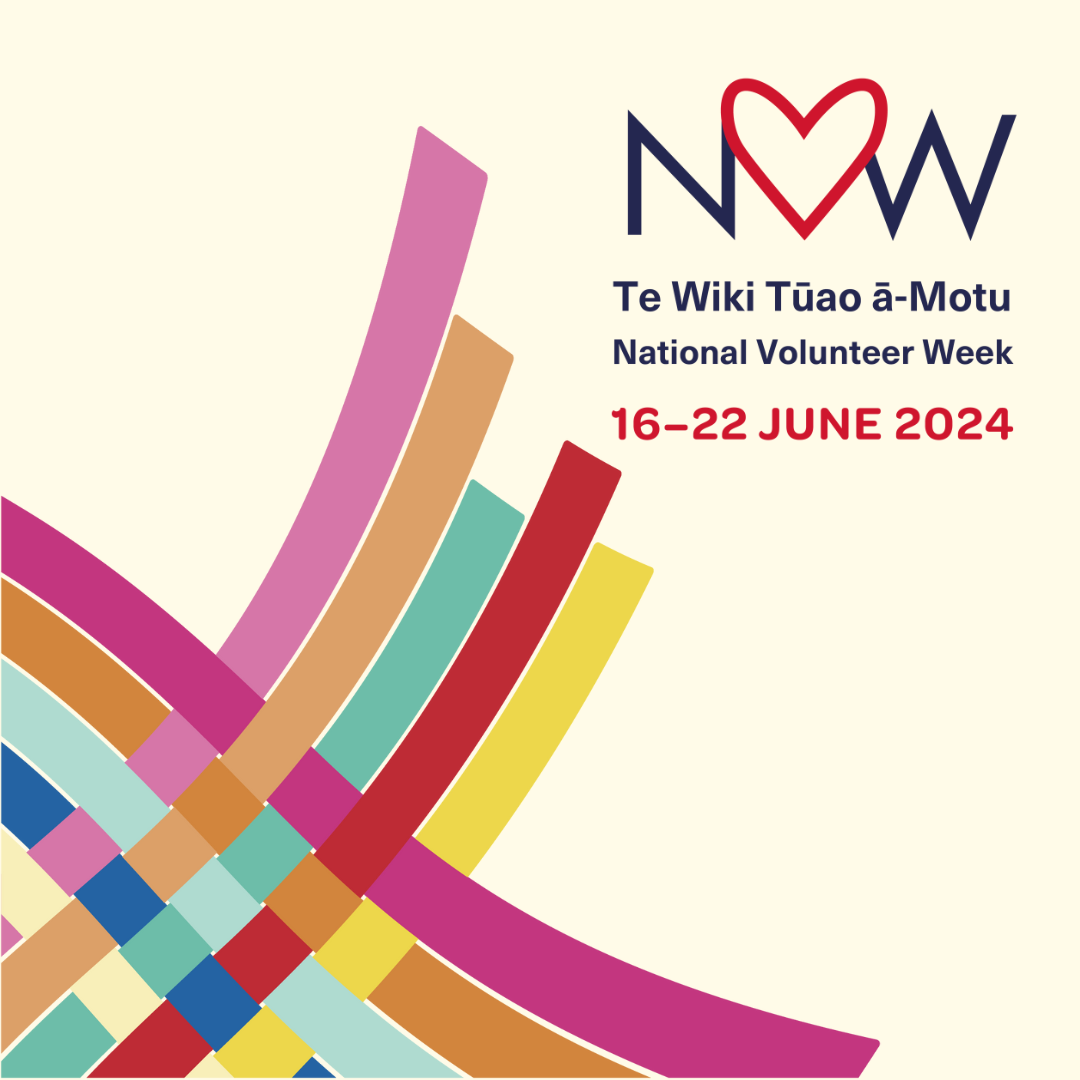
Latest News
Volunteers
Tell your volunteer story
Tell us your volunteer story for a chance to win a place at a special National Volunteer Week event!
To celebrate National Volunteer Week 2024 in June, Volunteering New Zealand is gathering stories of volunteering from across Aotearoa.We want to hear from:
- Individuals
- Organisations/ teams
The purpose of this story collection is to:
- Recognise volunteers: New Zealand is a nation of volunteers and we want the nation to recognise you!
- By sharing your stories, you can help us elevate and recognise the power of volunteering.
- Connect and Unify: The theme of National Volunteer Week 2024 is “Whiria te Tangata” weaving the people together.
- Volunteering connects people, communities, and society.
- What connections have you made through volunteering?
- What benefits have your communities seen?
- Celebrate: We will be holding a month-long celebration of volunteers and volunteering during June.
- Called ‘The Big Shout Out’ there will be local and national events and media promotion.
- We will select several volunteers/ organisation representatives to attend a National Volunteer Week event.
- In 2023, this was hosted by the Governor General.
How to participate
Use these forms to tell your story:
Or email your story to: margaret@volunteeringnz.org.nzQuestions
- What is your name?
- What is the main organisation you volunteer for?
- How did you get started in volunteering?
- What has your volunteering journey been like?
- What is the outcome/ impact of volunteering for you personally and for your organisation?
- The theme of National Volunteer Week is Whiria te tangata - weaving the people together.
- Have you made many new connections through your volunteer role?
- Has your volunteer work helped you meet people you may not otherwise meet?
- Is there anything else you’d like to add to your volunteering story?
By 30 April 2024.
Those participants selected to participate in the National Volunteer Week event will be notified by 14 May.※ Personal Information Collection Notice Volunteering New Zealand will collect your name and your e-mail address to communicate with you about your story submission.
You have the option to agree to us sharing your stories.

Volunteering New Zealand is on the hunt for an Operations and Administration Coordinator.Links to job ad:SeekDo Good JobsVolunteering is a huge part of who Aotearoa New Zealand is as a nation.
At Volunteering New Zealand | Tūao Aotearoa, we are kaitiaki of Mahi Aroha, and our vision is to empower our incredible team of 2.5 million volunteers to continue to enrich the lives of communities around Aotearoa New Zealand. The values | uara that drive us are:
- To care, nurture and grow | manaakitanga
- To build connections and enduring relationships | whanaungatanga
- To inspire by example | tūao
- To hold ourselves to the highest standard | whaiwhakaaro
Kōrero mō te tūranga - About the role This is a permanent part time role (24- 32 hours) where you will have a wide range of responsibilities and will be a key enabler for our small but mighty team.
Highly organised with a keen eye for detail, you will contribute to the processes, resources, events and campaigns that we develop.
You will get the opportunity to work across different and interesting projects throughout the year.
From organising our national conference, to campaigns such as national volunteer week and supporting us to develop training resources - you'll play a key supporting role in enabling our team to turn ideas into action.
You’ll also provide support across marketing and social media activities. Key responsibilities:
- Providing administrative support – organise travel, diary management, set up meetings, answer email queries
- Minute taking and preparing board papers
- Contribute to project planning and event organisation
- Database and internal systems management
- Help keep our website updated and current
- Posting on social media
- Keeping Mailchimp distribution lists and stakeholder network lists up to date
- Coordinate digital marketing campaigns
Kōrero mōu - About you This role is the heart of our office, and we are seeking a self-starter who thrives in a varied role where everyone pitches in.
You will ideally bring experience in a similar role, along with a genuine desire to have a positive impact on others through your work.
You love anything tech and if there is a glitch – we can count on you to resolve it! You will bring:
- A natural ability with technology and systems
- Experience in administration, operations, or office management
- Proficiency with Microsoft Office, especially Word and Excel
- Experience using Dropbox, MailChimp, Xero (ideal)
- Some experience with marketing coordination
- A+ written and verbal communication skills (proof-reading)
- Strong attention to detail and an organised approach to your work
- A commitment to te Tiriti
- An understanding of, and affinity with, other cultures
- A proactive approach with the ability to identify potential problems and find solutions
- A thirst for learning and continual improvement
- A self-starter, self-managing and proven organisational skills
- Experience with volunteering and commitment within the not-for-profit sector
- Project management experience (desirable).
Me pēhea te tuku tono - How to apply If you’ve been searching for a fantastic part time role with real purpose, look no further.
Please apply now with your CV and a cover letter letting us know a bit about you and what you’d bring to the role.
Applications close as soon as we find the right person– apply now, we’d love to hear from you!We've partnered with Kin to help fill this position.
For any questions, please reach out to Jamie on jamie.edmundson@kin.co.nz

Health
Leadership
VNZ Events
Wellbeing
Wellbeing webinars for volunteer managers
Staff and volunteer wellbeing in the community and voluntary sector has taken a hit in recent years due to increased demand for services, lack of funding, and difficult issues facing communities.
We are pleased to bring you a series of Wellbeing Webinars to boost your immunity and resilience.
Facilitated by a registered psychologist from Umbrella, each session will help you identify issues and make positive behaviour changes.

Shifting the frantic2 May, 10-11am, onlineIn our modern, hyper-connected, “always on” world, many people describe feeling constantly frantic, overwhelmed and as if they are constantly playing catch-up.
This mental overdrive often means it can be hard to utilise well-known time management strategies, manage stress, or work productively, and it can feel impossible to ever fully wind down.This session will:Look at the common factors behind the frantic ANDReview practical strategies proven to increase your experience of calm and control.Facilitated by Lisa Cheung of Umbrella.
Learn more about Umbrella here.Cost: $10 for VNZ member organisations. $20 for non VNZ member organisations.Register here.

Community
Research
Volunteers
Volunteering higher in rural New Zealand
Media release: 13 November 2023More people volunteer in rural New Zealand compared to the national average, a new report from Tūao Aotearoa Volunteering New Zealand shows.“We know volunteering across Aotearoa is generally strong but we wanted to understand how experiences might differ depending where you live,” says Volunteering New Zealand Chief Executive Michelle Kitney.State of Volunteering Regional Report – volunteering in New Zealand’s regions analyses data from Volunteering New Zealand’s research and from Statistics New Zealand.58.6% of people in rural areas volunteer, compared to the national average of 50.7% and 47.5% for the major urban centres (Auckland, Wellington, and Christchurch).“When it comes to the type of volunteering, people in rural areas have higher rates of informal/direct volunteering (at 43.8%) compared to the national average of 36.0%.
Yet this doesn’t come at the expense of formal/organisational volunteering which is above the national average,” Michelle says.The turnover rates of volunteering are lower in the smaller towns and cities, compared to main centres.
The report suggests volunteers in main centres have more choice of roles and might ‘shop around’ to find volunteering they enjoy.
Smaller towns and cities are likely to have fewer options for formal volunteer roles.“All volunteer-involving organisations, no matter where they are, should value volunteers.
We encourage them to tap into resources, such as our Best Practice Guidelines, to ensure volunteers have a great experience.“The report has highlighted challenges and opportunities to ensure the sector can support volunteering across all of New Zealand.
We advocate for better data about volunteering and unpaid work for all communities.”Volunteering New Zealand will be repeating its bi-annual State of Volunteering surveys of volunteers and community organisations in early 2024.EndsAbout Volunteering New ZealandTūao Aotearoa Volunteering New Zealand is the peak body for volunteering and volunteers in New Zealand.
Our vision is for volunteering to be valued and celebrated as a vital part of society.
Volunteering New Zealand works in a national advisory and sector leadership role.More informationMargaret McLachlanCommunications Manager, Volunteering New ZealandMargaret@volunteeringnz.org.nz027 247 8047
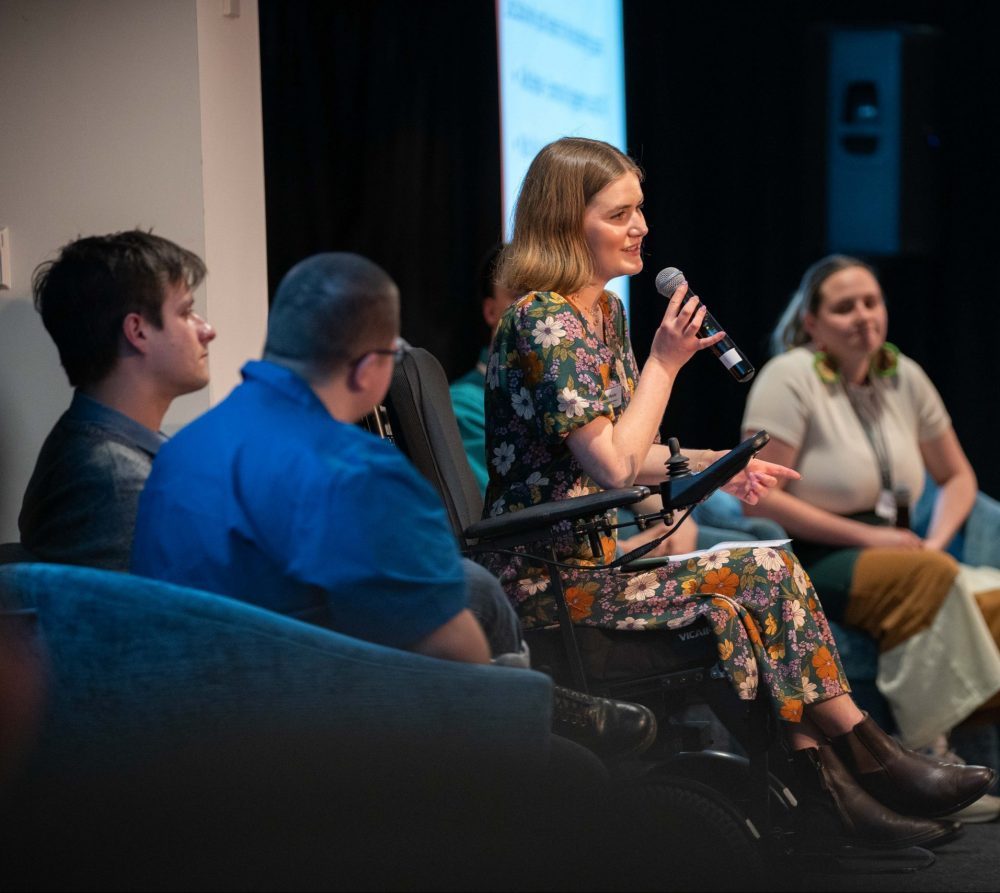
News
Volunteers
Youth
Leaders of tomorrow? Leaders for today!

Flexibility and understanding were the two key words that came out of the youth leadership panel at Volunteering New Zealand’s Leadership Hui.
Nick Abel (UN Youth New Zealand), Tobias Kenny (InsideOut Kōaro), and Nate Whitfield and Amelia Noyes (Hato Hone St John) gave some great tips for working with young volunteers.
The panel was facilitated by Alice Mander.
Bearing the brunt of decisions made by governments long before their time, young people are entering the workforce with much higher levels of debt, and greater financial insecurity than past generations.
As Professor Paul Spoonley told us in his talk on the changing demographics of Aotearoa, volunteer-involving organisations are going to have to consider these challenges when seeking to recruit and obtain young volunteers.
It is also important for organisations to recognise that many young people are already supporting their community and whanau.
For instance, the Pacific Economy Report found that 95.7% of the youth they surveyed had taken part in at least one hour of unpaid work or volunteering during the last four months, and 70% of their time spent on unpaid work was in the household, with cultural activities being the next largest portion.
Volunteer organisations and young volunteers
So, how can volunteer organisations meet the needs of their young volunteers?
If they can, our youth panellists said, be flexible with volunteer expectations.
Some young people may not be able to contribute as many hours as older volunteers, so having minimum hourly requirements may be a barrier.
There are also times in the year that some young people may not be able to volunteer at all - such as during University or school exams.
Understanding and making allowances for these periods may be important in showing young people that your organisation is committed to supporting them to volunteer in ways that meet their needs as well as your own.
You may also like to think of other ways young people can volunteer with your organisation, if the time commitment needed for the regular volunteer role is too great.
For instance, the young person may have a skill or expertise that your organisation is lacking - such as social media or marketing, photography or art, or writing skills.
Not only can these tasks be completed in the young person’s own time, but they can also be done remotely.
With the increasing pressures facing young people today, the positive effects of volunteering for both the young person and the community are more important than ever.
While there are unique challenges, the young leaders on the panel told us that these can be overcome, and the unique energies and skills of young people are invaluable.
Ultimately, as Nate said, “We’re changing our young people’s lives and, in turn, our community.”
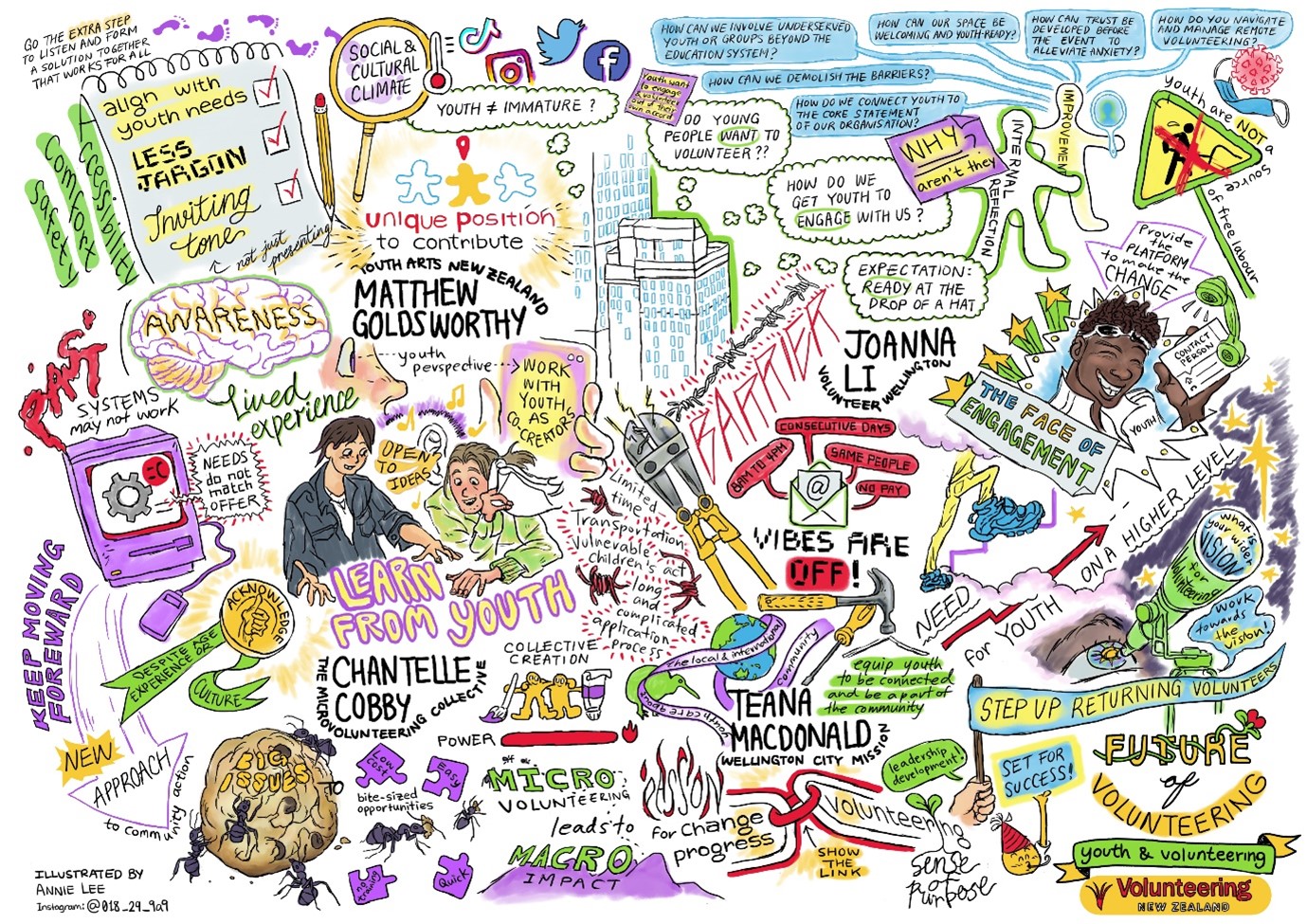
Social justice
Youth
Youth Volunteering and Activism
By Alice Mander, Volunteering New Zealand Community Engagement AdvisorWhere are all the young people?
It seems to be the question on the minds of many volunteer coordinators.
However, as a recent paper published by the International Association for Volunteer Effort notes, ideas about youth disengagement in civil society presents an incomplete story.
The paper argues that if we push ourselves to think beyond the “traditional forms of political engagement”, we will notice an emergence of different norms of participation, especially among young people.
Volunteering and activism have historically been considered two different types of activities.
However, most activists are themselves volunteers, and many volunteer activities have social and political outcomes.
The ways in which young people are engaging with their communities is progressively broadening, and the historic distinction between the two activities is becoming less relevant.
For instance, as the paper highlights, many young people enter traditional volunteer spaces (such as school boards or university councils) with aspirations of amplifying their voices and enacting change.
Where young people are left out of formal decision making processes, they create alternative spaces to make their concerns and opinions known.
New Zealand is home to many incredible volunteer-based youth activist groups, such as MakeIt16 and the SchoolStrike4Climate.
The paper also highlights that many youth led activities and volunteer efforts are deliberately politicised and resisted by the people and institutions in power.
Young people are often negatively framed as disengaged and lazy.
However, it has been observed around the world that young people are one of the most “intensely regulated groups”, and their activism is often disregarded “as a distraction”.
These narratives work to silence and repress youth activism and volunteering efforts.
It is time to move away from the deficit model that frames youth as disengaged.
Perhaps, as volunteer-involving organisations, instead of waiting for youth to approach us we need to be asking for invitations into the spaces and communities where youth are already active.
With young people frequently turning to volunteering and activism as a tool for social change, let's reconsider our own definitions and distinctions between the two activities, and reimagine how we can engage young people’s hearts as well as their minds.

Advocacy
Leadership
Research
Ask for funding for volunteer engagement
Nonprofit leaders need to become savvier about what they are asking funders to fund, according to new research.The research[1]Activating the power of Strategic Volunteer Engagement for a Better World found a gap between what funders and nonprofit leaders thought about volunteer engagement.
While nonprofit leaders cite recruiting sufficient volunteers and finding skilled volunteers as two main challenges, funders believe the biggest challenge to strategic volunteer engagement is financial resources.Strategic volunteer engagementWe argue that volunteer-involving organisations need to get more strategic about volunteer management and how that is funded.
We know that while volunteers give their time and skills freely, managing volunteers takes resources and planning.
As the recent Australian National Strategy for Volunteering 2023-33 states (p63):“Proper investment in volunteer management has the potential to profoundly transform volunteering in Australia.
This investment must be both internal — from within volunteer involving organisations — and external — through funding, grants, and other mechanisms.
Volunteer Managers are exceptionally passionate and talented professionals and elevating this critical role and function is long overdue.”Funders investmentWe believe this is also an important mindset change for funders – the perspective of another research document, The Funders’ Guide to investing in Volunteer Engagement[2]. This paper notes that investing in volunteer management will make a greater impact of grant-making dollars.
It will strengthen the ability of the volunteer-involving organisation to deliver on its goals.
What can be done to bring these two perspectives from community organisations and funders closer together?
We advocate for the community and voluntary sector to practice strategic volunteer engagement.
That includes:
- Supported and resourced volunteer managers
- Nonprofit Managers and Boards that value volunteering as a key strategic asset
- Investment in training e.g.
- Volunteer Best Practice Guidelines
- Strengthen ways to assess and report the impact of volunteer service
- Budget lines that detail volunteer management investment
- Funding requests and conversations that prioritise volunteer engagement
Find out more about Strategic Volunteer Engagement and watch webinars on this topic here.[1]Activating the power of Strategic Volunteer Engagement for a Better World (Initiative for Strategic Volunteer Engagement, May 2023)[2]The Funders’ Guide to investing in Volunteer Engagement (The Leighty Foundation, 2017)
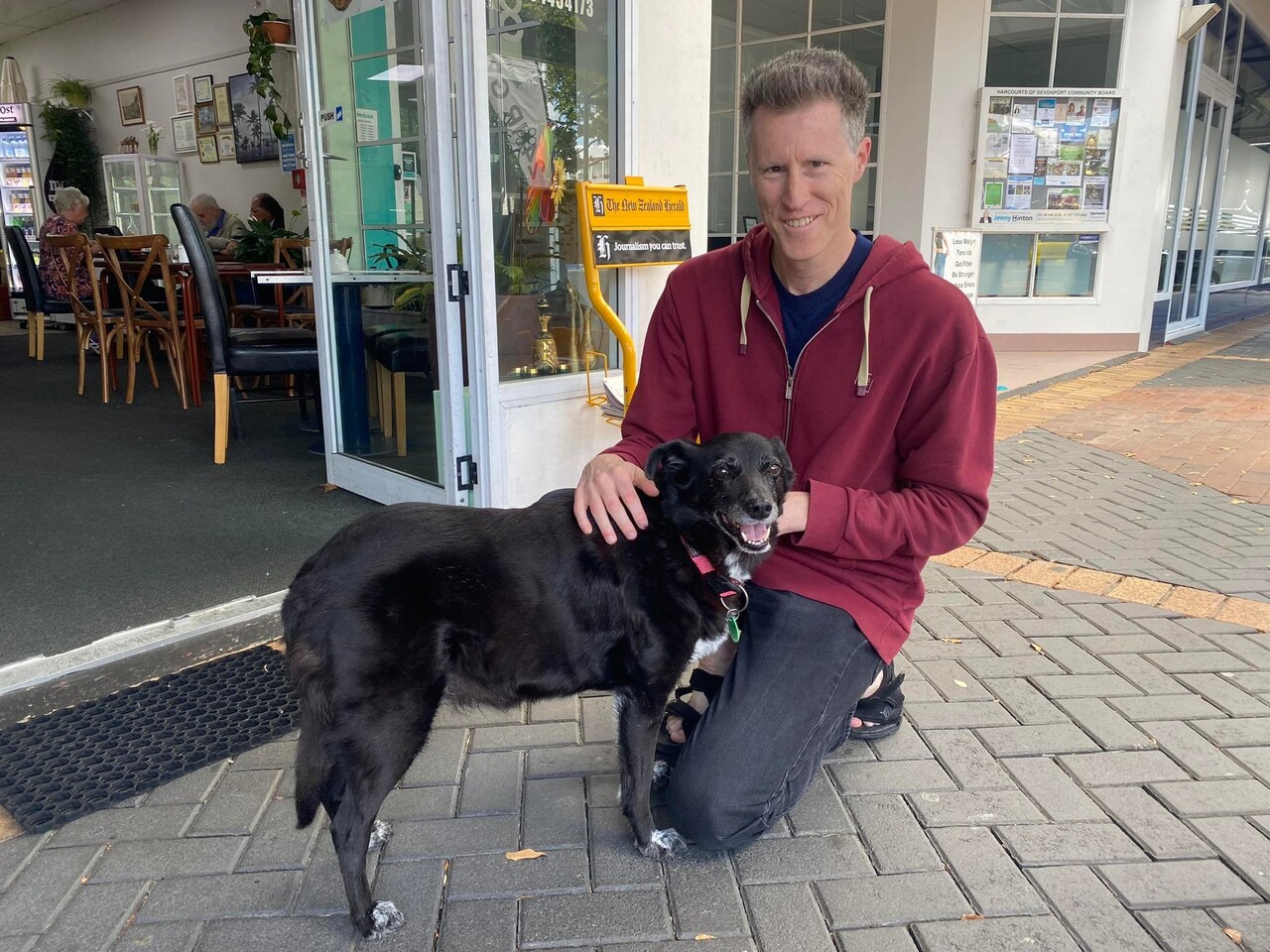
Community
Volunteers
Youth
Inspiring tamariki as a volunteer role model

Brian has blown us away with his commitment to inspire tamariki through Inspiring the Future Aotearoa.
He signed up to be a volunteer role model to tamariki to share his experiences as an Electronics Engineer and tell his story to help broaden career horizons for young people, and to show them that they can follow their dreams.
Inspiring the Future is a programme where young people hear from volunteer role models in their communities, learn about different jobs and why people love doing them, as well as their pathway and challenges they faced along the way.
This is done through fun events at schools.Brian has accepted invites to every event he is available for.
He has inspired students from multiple schools, answering questions about his job and showing them that it’s really fun to design technology that helps us all.
Here’s his story in his own words:Tēnā koutou katoaI'm Brian.
When you meet me you'll hear that I have a strange accent.
That's because I was not born here.
I was born in Cape Town, South Africa.
I moved to New Zealand six years ago, and I'm now settled here.
I have a house, a car, and a great job.
I play badminton at two different clubs and sometimes privately with friends too.
I love travelling, and have visited most of New Zealand already with a group of friends who do things together.I work as an electronics engineer, and my current role is to design technology for farmers to help them to produce our food.
The most exciting part of my job is seeing the funky things I design being made in the factory and sold to the farmers!
I enjoy studying how to use some of those tiny little electronics things, and designing those green PCBs (printed circuit boards) that use them, and then testing my design to check that it really does what it should.Sometimes my design is naughty, and it does some unexpected things, and then we all make jokes about the naughty design, and then I figure out what went wrong, and I fix that.
It's great fun!
I already knew that I wanted to be either an electronics engineer (or maybe a pilot) when I was in year 5.
But most children have no idea what they want to do.
I volunteered at an orphanage for many years, and some of the students I looked after there didn't know what they wanted to do even at the end of high school.I joined Inspiring the Future for two reasons.
One is that I love working with children, and the other is that I can help you think of other jobs that you may not have thought of, and show you that it's really fun to design technology that helps us all.
The best part of the Inspiring the Future events for me is seeing the students' eyes light up when I show them the physical PCBs that I have designed.
They are genuinely very curious, and they listen intently when I describe my job, and they ask many questions.
It is truly wonderful to see such a huge awakening when they realise that this sort of job appears in the most unlikely of industries such as health care, pet care, agriculture, transport, appliances, and so on.Of course, there are always challenges in life.
I struggled a lot with my school and uni studies, because I thought that I was not clever enough.
School was hard for me, but I worked hard because I really wanted to design technology, and I discovered that actually I am clever enough to do that!
And look, now that's what I do, and what I enjoy doing!
Cool, hey!
